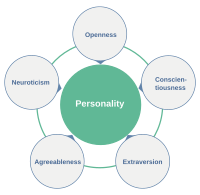
Photo from wikipedia
Abstract Objective This research attempted to clarify the role played by personality traits and self‐regulated motivation in affecting decision‐making tendencies. Method Study 1 (n = 209) examined whether the Big Five personality… Click to show full abstract
Abstract Objective This research attempted to clarify the role played by personality traits and self‐regulated motivation in affecting decision‐making tendencies. Method Study 1 (n = 209) examined whether the Big Five personality traits predict minimising, maximising, and satisficing tendencies; Study 2 (n = 460) tested the mediating role of self‐regulatory orientations in the relationship between personality traits and decision‐making tendencies by performing structural equation modelling with latent variables. Results Conscientiousness emerged as the strongest positive predictor of maximising, whereas openness to experience, conscientiousness, and agreeableness emerged as negative predictors of satisficing. As for the mediational model, both locomotion and assessment played a role in mediating the relationships between the personality traits and decision‐making tendencies. Conclusions This research provided interesting insights into the underlying motivations and strategies that lead individuals to maximise, satisfice, or minimise.
Journal Title: Australian Journal of Psychology
Year Published: 2018
Link to full text (if available)
Share on Social Media: Sign Up to like & get
recommendations!